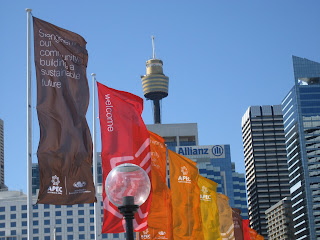
A general philosophy that most of us have heard of all our lives is that there are two sides to every story. Dr. Don Gordon and I (Anna) had the opportunity to hear the other side of APEC yesterday evening. Our group went and met with a NGO that was leading the fight to make APEC and its member economies focus more on the community and the people’s agenda rather than just the political, economic, and business agenda. What we saw in action was really what the Riley Institute strongly advocates – understanding that there is more beyond just policy and decision processes, there are people who those processes affect, whether good or bad, that must be discussed.
Quite different than the 61st floor view from the Sydney skyscraper that we had just come from, the NGO was located in a small crowded office on the outskirts of the city. Since their funding only comes from donations, it is clear that their efforts are fully driven by their passion, which you can’t help but admire whether you believe in what they are doing or not. What they are fighting for so strongly is fairer trade in the Asia Pacific region. They want human issues such as poverty, labor and environmental standards to be a main focus of APEC. They believe that a true global economy cannot exist without the provision of education and other development in the region’s poorest nations. They want APEC to serve more of community interest rather than what they see being the interest of the business executives. They are disappointed with APEC because it had promised in 1989 upon its creation that trade liberalization would increase the standard of living across the Asia Pacific region.
In our group there are students from Vietnam and China who contributed very interesting perspectives into labor and environmental issues that they wish could be addressed at APEC. Their comments about wanting a higher standard of living in their countries gave perspective into what the NGO’s are fighting for and also into what APEC must address in order to increase the standard of living in its member economies. Unfortunately, history over the last eighteen years has proven that free trade alone will not engender such progress.
Quite different than the 61st floor view from the Sydney skyscraper that we had just come from, the NGO was located in a small crowded office on the outskirts of the city. Since their funding only comes from donations, it is clear that their efforts are fully driven by their passion, which you can’t help but admire whether you believe in what they are doing or not. What they are fighting for so strongly is fairer trade in the Asia Pacific region. They want human issues such as poverty, labor and environmental standards to be a main focus of APEC. They believe that a true global economy cannot exist without the provision of education and other development in the region’s poorest nations. They want APEC to serve more of community interest rather than what they see being the interest of the business executives. They are disappointed with APEC because it had promised in 1989 upon its creation that trade liberalization would increase the standard of living across the Asia Pacific region.
In our group there are students from Vietnam and China who contributed very interesting perspectives into labor and environmental issues that they wish could be addressed at APEC. Their comments about wanting a higher standard of living in their countries gave perspective into what the NGO’s are fighting for and also into what APEC must address in order to increase the standard of living in its member economies. Unfortunately, history over the last eighteen years has proven that free trade alone will not engender such progress.

No comments:
Post a Comment